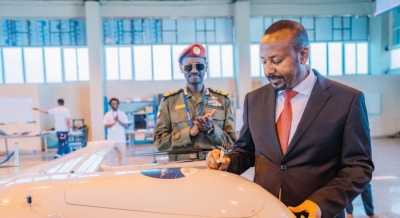The proceedings of the political meeting to promote the Security Initiative Against Proliferation dedicated to African countries opened on Wednesday, January 31 in Marrakech, at the initiative of the Kingdom of Morocco and the United States of America.
The political meeting to promote the Proliferation Security Initiative (PSI), which will continue until February 2, is co-chaired by the Director of the United Nations and International Organizations at the Ministry of Foreign Affairs, African Cooperation, and Moroccans Residing Abroad, Redouane Houssaini, and the U.S. Under Secretary of State for Arms Control and International Security Affairs at the U.S. Department of State, Bonnie Jenkins.
The Minister of Foreign Affairs, African Cooperation, and Moroccans Residing Abroad, Nasser Bourita, delivered a welcome address on this occasion.
This meeting aims to encourage African countries to support the PSI, a sustainable global effort aimed at ending the proliferation of weapons of mass destruction (WMDs).
The PSI seeks to create alliances between states to collaborate and use their national resources to create various legal, diplomatic, and military instruments aimed at preventing the transportation of dangerous cargo by road, air, and sea.
The opening session of this meeting was marked by the presence of ministers and delegations representing countries from the African continent, as well as regional partners and allies.
Comprising more than 100 countries, the Proliferation Security Initiative is a voluntary and flexible framework for multilateral cooperation launched in 2003 with the adoption of the "Principles of Paris," also known as the "Interdiction Principles."
The goal of this initiative, to which Morocco joined in 2008, is to strengthen cooperation among various actors through operational measures to combat the illicit transport of weapons of mass destruction, their delivery systems, and related materials.
Nasser Bourita: "In line with His Majesty's Vision, Morocco has always advocated multilateral cooperation in the fight against WMDs."
In his address, Nasser Bourita asserted that, in accordance with the enlightened Vision of His Majesty King Mohammed VI, Morocco has consistently championed multilateral cooperation as the most suitable framework to coordinate international efforts in the fight against weapons of mass destruction (WMDs).
The Kingdom's steadfast commitment in this domain is demonstrated through its adherence to international conventions on disarmament and non-proliferation, the minister added in a virtual address at the opening of the political meeting to promote the Proliferation Security Initiative (PSI) dedicated to African countries, held until February 2 in the ocher city.
Furthermore, Morocco has supported international initiatives in this field and intends to continue its fruitful partnership with the United States and African countries to integrate PSI into the African security landscape, Mr. Bourita continued.
The main asset of this international cooperation program, aimed at curbing the trafficking of weapons of mass destruction, their delivery systems, and related materials, is its "flexible, operational, and results-oriented" nature, he emphasized. He noted that the Marrakech meeting is the first of its kind held within the PSI framework with such a high level of quality and number of participants.
Mr. Bourita pointed out that the Moroccan experience has demonstrated the relevance of PSI in terms of inter-ministerial coordination to address the non-proliferation challenge. He added that the Marrakech meeting is an excellent opportunity to strengthen the ownership of PSI by African states, through the implementation of three priority actions.
Firstly, it involves recognizing that the African security environment is not isolated from the global security context. The second axis focuses on enhancing synergies through national efforts, organizing workshops, and operational exercises led by African military and civilian experts. Lastly, it is essential to ensure that the voices of African states are heard within the PSI by identifying and sharing "African lessons" drawn from best practices within the initiative, he detailed.
The increasing presence of Africa within the PSI is an encouraging sign, Mr. Bourita also commended, urging to capitalize on this momentum to make this mechanism a genuine platform of action for and by African states.
Motivated by the strong commitment of African states to participate in global efforts to combat WMD proliferation, the PSI meeting in Marrakech is also driven by profound changes in the African security context, he added.
Four major trends are expected to shape the future of security in the African continent and consequently our collective response to these challenges, Mr. Bourita noted, citing firstly the development of trade between Africa and the world, on one hand, and intra-African trade within the framework of the African Continental Free Trade Area (AfCFTA), on the other.
Although Africa contributes only 2.7% to global trade, its share in global maritime trade stands at 7%, with a coastline stretching over 30,000 km, making it a major source of vulnerability to proliferation-related threats, he explained.
For the minister, the second observation concerns the "strong" and "irrefutable" evidence of enduring alliances between terrorist and separatist groups and transnational criminal organizations.
The third, he continued, relates to the lack of regional and sub-regional cooperation that continues to hamper the continent's capacity to address transnational security threats, in the absence of genuine political will to change this state of affairs.
The minister mentioned, finally, the presence of "external actors" that continue to disrupt the continent's security environment by providing their proxies with inexpensive and devastating technologies and know-how.
All these trends create conditions conducive to the proliferation of WMDs, in a context marked by porous borders, coordination gaps, a weak legal and regulatory arsenal, and deficiencies in terms of national capacities, he concluded.
The proceedings of the political meeting to promote the Proliferation Security Initiative dedicated to African countries opened on Wednesday, initiated by the Kingdom of Morocco and the United States of America.
This meeting is co-chaired by the Director of the United Nations and International Organizations at the Ministry of Foreign Affairs, African Cooperation, and Moroccans Residing Abroad, Redouane Houssaini, and the U.S. Deputy Assistant Secretary of State for Arms Control and International Security Affairs, Bonnie Jenkins.











